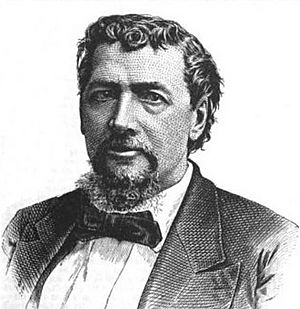William A. Phillips facts for kids
Quick facts for kids
William Addison Phillips
|
|
|---|---|
 |
|
| Member of the U.S. House of Representatives from Kansas's At-large district |
|
| In office March 4, 1873 – March 3, 1875 |
|
| Preceded by | David Perley Lowe |
| Succeeded by | Seat redistricted as 1st District |
| Member of the U.S. House of Representatives from Kansas's 1st district |
|
| In office March 4, 1875 – March 3, 1879 |
|
| Preceded by | Redistricted from At-large district |
| Succeeded by | John Alexander Anderson |
| Member of the Kansas House of Representatives | |
| In office 1865 |
|
| Personal details | |
| Born | January 14, 1824 Paisley, Scotland |
| Died | November 30, 1893 (aged 69) Fort Gibson, Oklahoma |
| Resting place | Salina, Kansas |
| Political party | Republican |
| Signature | |
| Military service | |
| Allegiance | United States |
| Branch/service | Union Army |
| Years of service | 1862–1865 |
| Rank | Colonel |
| Unit | 3rd Indian Home Guard |
| Battles/wars | American Civil War
|
William Addison Phillips (born January 14, 1824 – died November 30, 1893) was an important person in American history. He was a journalist, a brave soldier, and a U.S. Representative for Kansas. This means he was elected to help make laws for the country.
Contents
Early Life and Career
William Phillips was born in Paisley, Scotland. He went to school there when he was young. In 1838, when he was 14, he moved to the United States with his family. They settled in Randolph County, Illinois.
Phillips worked on farms for a while. Later, he became a newspaper writer, reporting on events from 1845 to 1862. He also studied law and became a lawyer in 1855. He started his law practice in Lawrence, Kansas. He also wrote for the New York Tribune newspaper.
He was a judge on the first Kansas Supreme Court under the Leavenworth Constitution. In 1858, he helped found the city of Salina, Kansas.
Serving in the Civil War
During the American Civil War, William Phillips chose to join the Union Army. He could have earned a lot of money as a war reporter, but he decided to fight instead. In 1861, he helped gather some of the first troops in Kansas.
He became a colonel, which is a high rank in the army. He led a special group called the Cherokee Indian Regiment.
After the War
After the war, in 1865, Phillips worked as a lawyer for Cherokee County. He also served in the state's House of Representatives that same year.
Political Career
William Phillips was a member of the Republican Party. He was elected to the United States Congress three times. He served from March 4, 1873, to March 3, 1879.
After leaving Congress, he continued to help people. He worked as a lawyer for the Cherokee Indians in Washington, D.C..
Later Life and Legacy
William Phillips passed away on November 30, 1893, in Fort Gibson, which is now in Oklahoma. He was buried in Gypsum Hill Cemetery in Salina, Kansas.
The city of Phillipsburg, Kansas was named in his honor.
 | Georgia Louise Harris Brown |
 | Julian Abele |
 | Norma Merrick Sklarek |
 | William Sidney Pittman |

